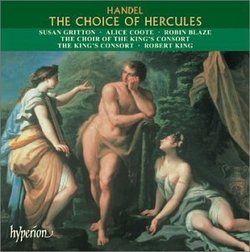A voice teacher and early music fan
George Peabody | Planet Earth | 01/21/2006
(5 out of 5 stars)
"IMMORTALITY (VIRTUE) OR IMMORALITY (PLEASURE)? THAT'S MY CHOICE!!???
"The Choice of Hercules"is in effect a one-act dramatic cantata in English, and as such it is unique in Handel's output. When Handel introduced English oratorios to London, he did not confine himself to sacred subjects, exploring also Classical myths, with texts based on Roman and Greek literature. 'The Choice of Hercules' marks Handel's last realization of a Classical tale.
It is the story of a young man on the threshold of manhood (Hercules-Robin Blaze-countertenor) contemplating his future. Two women appear to him. One, eager and seductive, shows him a path that offers indolent pleasure (Pleasure-Susan Gritton-soprano). The second woman, tall and beautiful, is identified as Virtue(Alice Coote-mezzo soprano); she warns Hercules that what is really good can only be obtained through hard work. There is also an attendant on Pleasure who is a cheerleader for her. Charles Daniels sings this role.
I especially liked Mezzo Alice Coote's interpretation of Virtue. She was very strong dramatically and vocally. Susan Gritton as Pleasure was formidable in her role. However, all of the singers sang well in their respective roles. I always find it difficult to accept Blaze's characterizations. In this cantata he is choosing his future path. Will it be Pleasure or Virtue? He sings it as if he were choosing the flavor of an ice cream cone instead of temporary life or immortality.
Robert King must be commended for his judicious choice of tempos, attractive melodic phrasing, and careful attention to aspects beyond the solo singing(such as the sympathetic management of Handel's orchestral and choral writing). Special mention must be made of tenor Charles Daniels, who though he was in a minor role, was outstanding in his historically-informed and elegant singing.
Robert King provides a highly intriguing work by Maurice Greene ('Hearken unto ye, ye holy children') to couple 'Hercules'. A contemporary of Handel, and by all accounts and arch-rival, particularly when he was chosen above Greene by George II to write the new anthems for his Coronation. Greene's ode on this disc contains some fine music, but hardly equal to either Purcell or Blow for unabashed brilliance, let alone Handel at his best. However, it is a curious coupling and receives an exciting interpretation by the three male soloists: Robin Blaze, Charles Daniels and Peter Harvey!
Full marks to Robert King who has assembled a formidably superb collection of artists to perform this particularly attractive oratorio."
Handel and Greene--an Odd Couple That Make Nice Music Togeth
M. C. Passarella | Lawrenceville, GA | 02/12/2009
(5 out of 5 stars)
"The other reviews on this page cover the genesis and character of Handel's little choral entertainment, so I won't revisit those issues here. I'll simply state that if the work isn't top-drawer Handel, it certainly comes from high on the pile in Handel's full-to-bursting second drawer. The music is unfailingly bright (some of that has to do with the range of the voices involved--mostly high voices), attractive, and written with Handel's usual care to convey the personalities and emotional equipage of his dramatis personae. So Pleasure's music often fairly dances, while Virtue's plies a steadier, more high-minded musical course. The chorus, in Greek chorus fashion, provides perfect commentary on the slight action of the piece.
As the notes to the recording point out, Hercules' final aria and the final chorus are both in the minor key. There seems to be some commentary here on Handel's part: the road of virtue may be an elevated one, but it's not without potholes. That road, of course, led our hero to his irksome Twelve Labors and to a terrible death right out of, well, Greek mythology. But that's beyond the scope of Handel's little work, even if the master glances toward the later life of Hercules in those somber final pages of "The Choice."
The anthem "Heaken unto Me, Ye Holy Children" (1728), with verses from the Apocrypha and Psalms, is at first glance a curious choice as a makeweight. The composition's theme, certainly, is virtue (or its religious analog, holiness), but this is clearly a sacred work that recalls, in its finest pages--a duet for tenor and countertenor and a solo for bass--the sacred music of--who else? Handel. Yet the pieces I'm reminded of were written perhaps ten years after Greene's work: Handel's anthem "Sing Unto God" and "The Lord Is a Man of War" from Israel in Egypt! Greene's choruses may be routine and four-square compared to Handel's, but the vocal writing is expert, and I'm glad for the opportunity to know this work.
In sum, an important offering from the always enterprising Robert King and Hyperion. The singing and playing are of the highest order as well, and it's all captured in Hyperion's usual clean, airy sonics."

